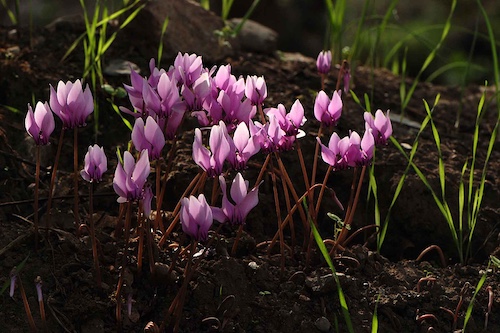(Cyclamen)
It’s a wonderful event every year: the first rain after summer that turns Lesvos completely green again in just a few days. This year, the island groaned under a prolonged drought, which had already been foreshadowed by a dry spring. I can’t even remember when it last rained: was it in April, or was it in May? And the amount of water that fell wasn’t much. The land dried up rapidly; there was no refreshing rain in August and September was left with a scorched earth and shriveled olives that fell from the trees en masse due to water scarcity. Other trees sadly had their leaves hang as if they were living their last days. The landscape was yellow and miserable, setting anxious tongues wagging: what if there was no more rain at all?
It wasn’t until October that the first rain finally kissed the earth of Lesvos awake. And this time, the sky was pretty generous with its water, that fell during several days. All those showers couldn’t save most of the olive harvest, only persuaded quite a few trees not to give up.
The earth came back to life: entire armies of snails crawled out of their dark hiding places, but it was especially all the grasses and other small creatures that – as soon as they smelled the water – shoot up above the earth to breathe in the fresh air. If you had pulled up a chair and sat down, you could have seen all those green shoots and tiny leaves growing: a great metamorphosis. Yellow sternbergias are now cheerfully giggling among the fresh grass, purple cyclamen are impatiently waving their frivolous little flowers, and the autumn crocus is letting its orange stamens gleam between the petals, as if a drought had never reigned.
The ancient Greeks believed that Persephone, daughter of Demeter and goddess of agriculture and grain, indicated when autumn began. She was kidnapped by Hades, god of the underworld, which so upset her mother that the earth dried up and the people withered. Zeus had to intervene to save the earth, and he ordered Hades to release Persephone. But Persephone was first tempted by an alluring, blushing pomegranate. She ate six pomegranate seeds, not knowing that whoever eats something in the underworld must stay there forever. Fortunately, a deal was struck and Persephone only had to stay in the underworld for six months. And so it is spring when Demeter embraces her daughter again and gets to work, and autumn arrives when Persephone returns to Hades and her grieving mother sets to rest.
However, with the warming up and drying of the earth in Greece, it seems as if Demeter is already in August mourning her daughter’s upcoming departure. So when Persephone each October disappears for half a year into the dark depths of Hades, the earth no longer mourns with Demeter. Because besides the green metamorphosis, there’s also an abundance of fruit in those days. I don’t know if figs, walnuts, and grapes are considered summer fruits, but they certainly herald the arrival of autumn. They will be followed by pomegranates, quinces, chestnuts, apples and mushrooms. The arrival of such a rich season should be reason for a celebration.
Autumn is therefore better explained with another myth: that of Opora. Opora is the goddess of fruit and is involved in the transition from summer to winter. I had never heard of this autumn goddess before. She plays a role in ‘Peace’, a comedy by Aristophanes, and the Greek word for autumn is partly named after her: fthinóporo. The only myth surrounding her is the one with Sirius, the Dog Star, the brightest point of light in the constellation Canis Major. Sirius sometimes wandered around on Earth: that’s where he saw Opora and fell in love instantly. To seduce her, he stoked his starfire and shone so brightly that the earth scorched and the people called upon the gods for aid. It was Boreas, god of the north wind, who came to their aid. He had his sons take Opora to Sirius, after which he himself cooled the Earth. Opora tempered the heat of Sirius with her love and squeezed all that green and fruit out of the drought, repeating this each year. And so autumn came to the earth.











